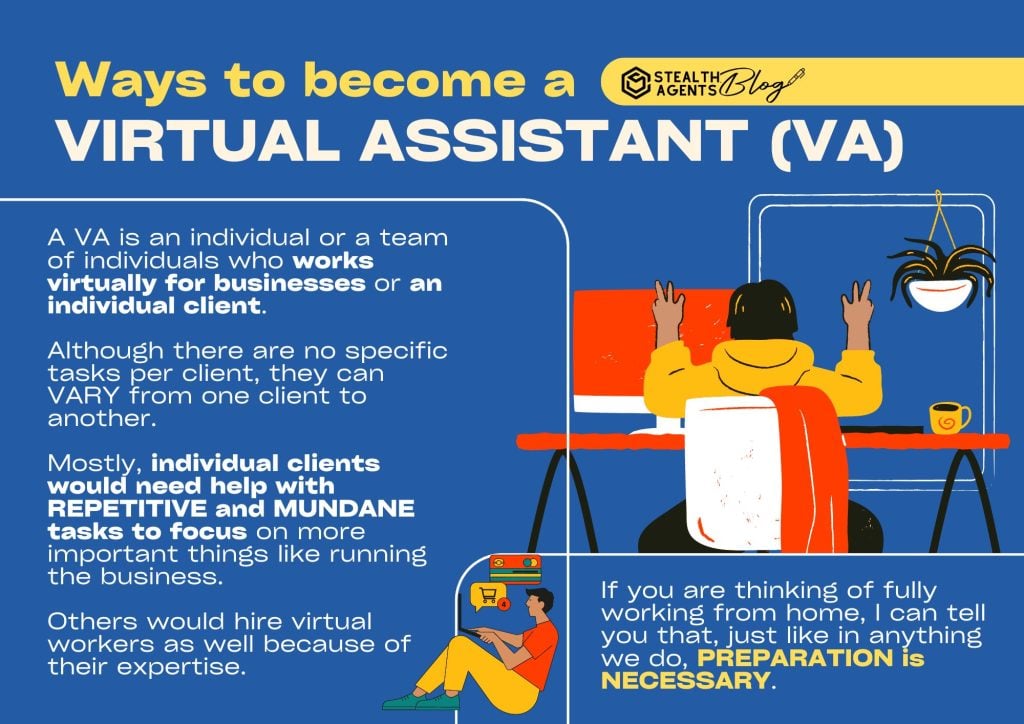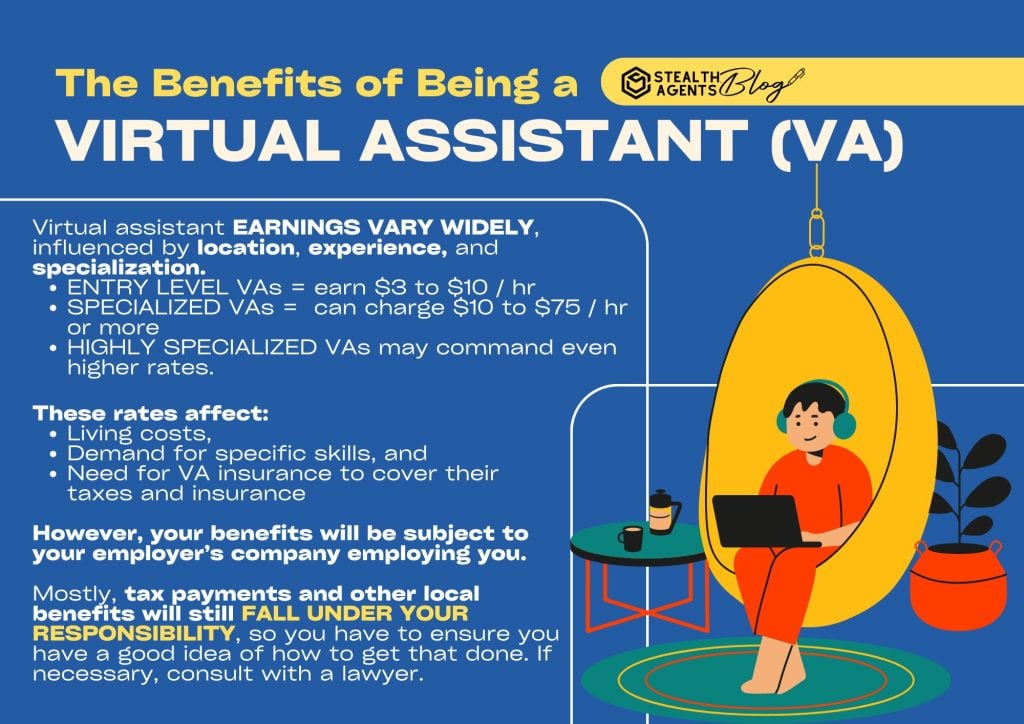When the pandemic hit, businesses were forced to shift their business to have their employees work from home or outsource service virtually to survive and find ways to keep customers happy.
Those coming into the office suddenly found themselves working remotely and discovered the benefits of working remotely.
Even though most people return to their offices, some employees prefer working from home.
Let us discuss this further if you are considering shifting to working from home and how to become a virtual assistant.
Ways to become a virtual assistant
Before anything else, let us define and understand what a virtual assistant is.
A virtual assistant is an individual or a team of individuals who works virtually for businesses or an individual client.
Although there are no specific tasks per client, they can vary from one client to another.
Mostly, individual clients would need help with repetitive and mundane tasks to focus on more important things like running the business.
Others would hire virtual assistants as well because of their expertise.
Now that you have a pretty good idea of what a virtual assistant is let’s talk about the things you need to prepare for if you are thinking of exchanging your full-time office job for working remotely.
If you are thinking of fully working from home, I can tell you that, just like in anything we do, preparation is necessary.
Before jumping on the bandwagon, there are basic things that you will need to know and assess on how to become a virtual assistant.

Virtual assistant equipment needed
These are the things to prepare to work as a virtual assistant.
1. Workspace

A workspace is essential for virtual assistants to be able to work productively.
Being able to work from home comes with convenience, with many distractions such as TV, radio, events at home, etc., so having your own space without all the distractions is very important for a virtual assistant.
You can search for ideas on setting up your workspace or creating a productive one.
You don’t need to use up all of your savings to be able to achieve this. A clutter-free and distraction-free space is vital for you as a virtual assistant.
2. Laptop or PC

A virtual assistant must have a piece of suitable equipment, a Personal Computer or laptop.
Preferably get the latest model so you can use it for many years. Most clients or companies would require an i5 and above.
They would usually do an equipment check during the interview and a headset and camera to meet you virtually, so you better get those ready as well.
Just make sure you have good equipment that can help you accomplish your tasks on hand.
3. Internet connection

A reliable internet connection is significant for you as a virtual assistant.
Think of it as the gas of your car.
No gas means you can’t go anywhere. So as a virtual assistant, your internet connection is your lifeline and a backup connection.
Although employers would rarely require you to have 2 LAN connections, at least have mobile data available in case of emergency such as power interruptions or your main line getting disconnected.
How to become an online personal assistant
Aside from the logistics, there are other things you will need to consider and assess before you make that jump.
Here are the things you need to check:
1. Finances

When looking for a job as a first-time virtual assistant can be challenging.
If you currently have a regular job, do not quit immediately to keep a steady source of income.
It doesn’t mean you will stop immediately as soon as you land your first client.
The thing about working from home is unless a good company employs you or they offer you a long steady job and you feel comfortable enough to let go of your site work.
Make sure you have funds to cover expenses in a few months for bills while looking for remote work, and if a client ends their contract, don’t fall behind in your responsibilities.
2. Skills check

Most virtual assistant services are repetitive administrative tasks, but some may require more advanced skills depending on the job post you are applying for.
If you are new, it will help you to reflect on the skills you acquired in your previous work.
Highlight those skills to increase your chances of getting hired faster.
When you gain more experience, you may want to consider specializing in a particular field or niche such as technical support virtual assistant.
Either you become an expert in one specific place, or you can also keep learning new skills to give you that flexibility to deal with different clients and the required tasks.
You can take online classes, primarily self-paced courses, that will allow you to take them at your convenient time.
The prices may vary, so you must select the plan or method within your current financial state.
If you are lucky enough, the employer sometimes offers to train you.
3. Right behavior

Suppose you are used to having all eyes on you in the office.
In addition, as a virtual assistant, clients rarely check on you or micromanage your tasks which can be an adjustment.
Thus, if this is your first time as a virtual assistant, they usually give you a set of tasks and a deadline to meet.
They would expect you to accomplish the tasks discussed and communicate if there are challenges and questions along the way.
Therefore, integrity plays a big part in this setup.
Also, getting to know the guidelines of an offshore virtual assistant, understanding why time management is important, and knowing the best ways to create a to-do list that works to plan your day can guarantee your success and maintain a good relationship with your client.
Like in any company, your efficiency and contribution to the team will be measured and will determine your capacity to work.
4. Regular employment

Regular employment refers to hiring a virtual assistant as a full-time employee, with a set number of hours and a fixed salary.
This is the more traditional approach to hiring an assistant, and it comes with certain advantages:
- Stability: With regular employment, businesses can expect their virtual assistant to be available during specific hours consistently.
- Consistent workload: As a full-time employee, a regular virtual assistant can work variety of tasks and projects for their employer.
- Invested in the company: Regular employees are often more invested in the success of the company as they are part of it long-term.
However, there are also some drawbacks to regular employment:
- Higher cost: As a full-time employee, businesses must cover salary, benefits, and other expenses.
- Limited flexibility: Virtual assistants on regular employment may not be able to adjust their schedules or work on additional projects outside of their set hours.
5. Project-based virtual assistant

On the other hand, project-based virtual assistants are hired for specific tasks or projects-based virtual assistants, with a defined scope and timeline. This option offers some unique advantages:
- Lower cost: Businesses only need to pay for the specific projects or tasks they need completed, rather than a full-time salary.
- Flexibility: Project-based virtual assistants can often adjust their schedules and take on additional work outside of the defined project scope.
However, there are also some downsides to consider:
- Less stability: As project-based workers, virtual assistants may not be available for ongoing projects or tasks.
- Less invested in the company: Project-based workers may not have the same level of commitment to the company’s success as regular employees, as they are only involved on a project-to-project basis.
5. Compensation

This can be the exciting or challenging part of how you perform. Most virtual assistant contracts are paid hourly, ranging from $3 to $15, depending on your expertise. You can expect fees to be taken out of your base pay if you use other platforms to acquire clients.
Mostly, the hourly rate is for an individual client, while the monthly wage is the setup for companies and businesses.
6. Job Application

I know you pretty much have an idea of how to apply for a job in the corporate world. Applying for a job remotely, however, is slightly different. There are three ways you can get hired.
- Promote yourself
meaning you look for potential clients and message them. Inform them of the services you offer and what benefits it will give them to hire you.
- Apply for the Job Ad
it used to be harder to apply for a job remotely, but now many platforms have opened up, and the virtual assistant requirements to get verified have been less restrictive.
Some websites allow both job seekers and employers to meet.
Enrolling in these platforms, however, sometimes has service fees applicable in return for a guaranteed job contract, which is safe for both parties. That would be a different story if you applied directly to a company.
- Company Job Ad
It is like submitting your resume to a company. However, instead of going into the office, as these are primarily offshore clients, you will have regular virtual meetings and report to online chat apps for updates and check-ins.
Services
In-demand offshore services span administrative support, customer service, social media management, content creation, digital marketing, marketing virtual assistant, bookkeeping, personal errands, technical support, project management, and research.
These services highlight the growing preference for specialized, flexible support, allowing businesses and professionals to enhance efficiency and scale operations cost-effectively.
Depending on the requirements of the individual or organization they are aiding, a virtual assistant can offer a diverse range of services. Some everyday tasks and services that virtual assistants offer include:
1. Administrative tasks

Individuals and businesses can efficiently manage their operations with the help of a virtual assistant, who can perform a range of administrative tasks.
These include handling email and calendar management, organizing data, managing files, making travel arrangements, scheduling and coordinating meetings, preparing documents, providing virtual call assistance, tracking expenses, and conducting primary research.
Virtual assistants are also responsible for organizing digital files, ensuring secure storage, managing version control, controlling access permissions, backing up files, archiving, retrieving documents upon request, implementing security measures, and performing routine maintenance tasks to keep the file management system efficient and effective.
2. Customer support

Virtual assistants play a vital role in customer support, managing email, live chat, phone, and social media channels.
They handle inquiries, process orders, assist with returns, and gather feedback.
Virtual assistants also manage customer scheduling tasks such as appointment scheduling, rescheduling, and sending reminders.
They handle calendar management, booking system administration, follow-up communication, and inquiries.
Additionally, they can integrate scheduling systems with other tools and develop customized solutions for efficient scheduling processes.
3. Content creation

Virtual assistants are integral to content creation, aiding in research, ideation, writing, editing, and optimization.
They format content for different platforms, manage content calendars, and distribute content effectively.
Additionally, they track performance metrics, repurpose content, and collaborate with team members.
Overall, virtual assistants streamline the content creation process, ensuring businesses produce engaging and impactful content that resonates with their audience.
4. Lead generation

A virtual assistant can assist in lead generation by researching to identify potential leads, managing databases to organize lead information, and executing outreach campaigns through email marketing and social media.
Virtual assistants can also optimize LinkedIn profiles, conduct targeted prospecting, and send personalized connection requests to potential leads.
They can also engage with prospects by sharing relevant content, participating in discussions, and setting up automated message sequences for follow-up.
Additionally, virtual assistants can track leads, analyze performance, and provide valuable insights to refine lead-generation strategies effectively.
They can also help qualify leads, create content to engage prospects and follow up with leads to nurture them until they are ready to purchase.
5. Social media management

Virtual assistants handle social media marketing tasks, including content creation, scheduling, and community management.
They engage with the audience, monitor conversations, and analyze performance metrics.
They also assist in campaign management, influencer outreach, and content curation while contributing to strategy development and reporting.
6. Research

Virtual assistants assist in research efforts by gathering and organizing information on various topics, including market trends, competitor analysis, and customer preferences.
They collect data from different sources, conduct literature reviews, and analyze research findings.
Additionally, they assist in product research, prospect research, and keyword research for SEO purposes.
Virtual assistants compile research data into structured formats, prepare reports, and provide valuable insights to inform decision-making processes effectively.
7. Bookkeeping and accounting

Virtual assistants support bookkeeping and accounting virtual assistant tasks by tracking expenses, invoicing clients, managing accounts payable and receivable, and reconciling bank statements.
They generate financial reports, assist with tax preparation, and help with budgeting and forecasting.
Additionally, they process payroll, prepare for audits, and provide valuable insights for financial decision-making.
Overall, virtual assistants streamline financial processes and ensure accuracy in financial records, contributing to the financial health and success of businesses.
8. Project management

Virtual assistants aid in project management by managing tasks, facilitating communication, and maintaining project documentation.
They schedule milestones, track resources, and budgets, and identify and mitigate risks. Additionally, they generate reports, ensure quality standards are met, and manage stakeholder relationships.
Overall, virtual assistants streamline project processes and contribute to successful project outcomes.
9. Personal tasks

Virtual assistants offer support with personal tasks, including calendar management, travel planning, email communication, errands, financial management, research, health tracking, home management, personal development, and event planning.
They assist individuals in staying organized, managing their time efficiently, and addressing various aspects of their personal lives.
These are just some examples of the services that virtual assistants can provide. The specific tasks and responsibilities can vary depending on the needs of the client and the skills of the virtual assistant.
Benefits
Mostly, virtual assistants are individual contractors. Meaning they are not employed by a company but by an individual.
Virtual assistant earnings vary widely, influenced by location, experience, and specialization.
Entry-level virtual assistants can earn $3 to $10 per hour, while those with more knowledge and specialized skills, such as in digital marketing or technical support, can charge $10 to $75 per hour or more.
Highly specialized virtual assistants may command even higher rates. Some virtual assistants opt for package rates, offering services for a flat fee.
These rates affect living costs, demand for specific skills, and the need for virtual assistant insurance to cover their taxes and insurance.
On such occasions, you will have to make voluntary payments to government offices to ensure you can still avail of medical or retirement benefits.
However, your benefits will be subject to your employer’s company employing you.
Mostly, tax payments and other local benefits will still fall under your responsibility, so you have to ensure you have a good idea of how to get that done. If necessary, consult with a lawyer.

Can you become a virtual assistant with no prior experience?
Becoming a virtual assistant without prior experience is possible if you have the right mindset and commitment. Here’s a step-by-step guide:
1. Assess Your Skills and Interests

It is important to identify the skills, strengths, and interests that are related to the tasks associated with being a virtual assistant.
These tasks may include organization, communication, time management, and computer proficiency.
2. Gain Relevant Skills

Take online courses or tutorials to develop skills in administrative tasks, customer service, social media management, basic bookkeeping, and software tools commonly used by virtual assistants (e.g., Microsoft Office, Google Suite, project management tools).
3. Build a Professional Online Presence

Craft a polished resume or portfolio showcasing your skills, accomplishments, and pertinent education or training.
Set up profiles on freelancing platforms (e.g., Upwork, Freelancer) and professional networking sites like LinkedIn.
4. Apply for Entry-Level Positions

Look for entry-level virtual assistant positions or internships advertised on job boards, freelance platforms, or social media groups.
Feel free to apply for jobs that align with your abilities and passions, even if they don’t specify prior experience as a requirement.
5. Network and Seek Mentorship

Join online communities, forums, or groups for virtual assistants to network with professionals in the field, ask for advice, and seek mentorship opportunities.
Forming relationships can create avenues for employment prospects and provide helpful advice.
6. Continuously Learn and Improve

Stay updated on industry trends, tools, and best practices by reading blogs, attending webinars, and taking additional courses or certifications relevant to virtual assistant work.
Make it a habit to seek feedback and aim to improve your skills and services continuously.
7. Market Yourself Effectively

Showcase your skills, experiences, and accomplishments on your online profiles and marketing materials.
Ensure you emphasize your value proposition and what distinguishes you from other virtual assistants.
8. Provide Excellent Service

Once you land clients, focus on providing exceptional service, exceeding expectations, and building solid relationships.
Clients who are happy with your services are more inclined to recommend you to others and provide testimonials, which can assist you in attracting additional clients and expanding your virtual assistant business.
With determination, continuous learning, and a proactive approach to gaining experience and building your skills, you can successfully transition into a virtual assistant role, even with no prior experience.
Takeaways
In summary, you will be in charge of your success or failure. Constant innovating processes to make your work efficient benefit you and your client.
Starting as a virtual assistant may be tough initially. Getting a client can be challenging and discouraging.
All I can say is you must prepare to be rejected several times and learn not to take it personally. However, if you are serious about how to become a virtual assistant, don’t give up.
Try and try again. Use your spare time to learn; eventually, all your hard work and determination will pay off.
And if you are looking for the best and top choice virtual assistant agency, Stealth Agents can provide their elite VA. Check out their website and book a free discussion about your preferences and pricing information.













